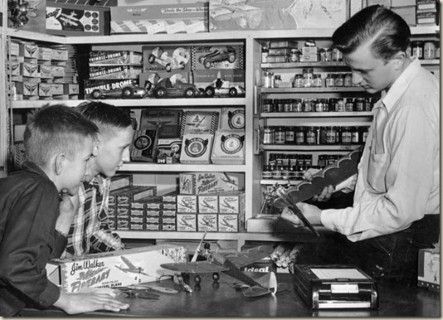One of the joys of my childhood was to spend literally hours day dreaming in the local hobby shop. It was a warm, welcoming place, set up to extract money from your wallet, but to provide both advice and and counseling.
But, that business model was already under pressure from online retailers even before the internet slaughtered the advice and counseling aspect of the vaunted Local Hobby Shop (LHS).
Fond Memories
I am sure some of my hagiography of the LHS is because I hung out there for long stretches, dreaming of the fun I might have, if only I had cash. D&J Hobbies on Campbell Avenue was my main go to (but “The Train Stop” in Sunnyvale was also a haven) stocking plastic models (I was partial to planes), trains, cars, and all sorts of stuff to help you build to your fantasy’s desire.
Staffed with friendly guys (I seem to recall it being almost all men) who could talk at length about their love of their profession.
The aisles were crammed full of delight. Being on the poorer side of the equation, I bought a lot of the less expensive kits, but I drooled at the visible P51 Mustang, and the Mamiya larger WWII artillery pieces.
It was a happy place in a less than happy childhood.
The Reality
Regardless, the LHS was a business, and a fairly inventory intensive business. They needed turnover of their inventory. That meant that while there were some dusty gems you could find on the shelves, from a bygone era, they stocked what sold. And what sold well. It also meant that they could afford one or two brands in each category. As a kid with stars in his eyes, this didn’t bother me, but I presume that the older (and with more disposable income) clientele’s purchasing patterns dictated what was stocked.
This meant that a reasonable community (south SF Bay Area, about 1M population) could support several LHS’s and they could each specialize. Perhaps one was big on RC planes and helicopters, one in the Martin trains (the gold standard), and one in cars.
But then came the internet. First the advice that was offered from behind the counter shifted to web pages, so you could do all your investigation up front before walking into the shop.
Then came the e-commerce. At first not taxes meant that Amazon could undercut your prices by 8-10% without impacting margin, but then the sales volume drove lower costs, and finally the LHS’s gave up the ghost. Who knows where their staff ended up, perhaps building followings on YouTube and in the blogosphere.
Now, the LHS has to have some special hook. NorCal Hobbies has a RC Car track. J&J Customs serves a niche mostly internet based presence with a small retail operation that feels like a hobby more than a business.
The business model that seems to work is to source parts and inventory in China, and build either an eBay or Amazon store, and sell piecemeal to end users throughout the world. As Kevin Talbot will tell you, he makes six figures by importing and selling items from China to enthusiasts, and is constantly building his brand online with his YouTube channel, and other promotions.
Summary
Like with local bicycle shops, the internet has removed much of the value of the local shop, the local hobby shop is a dying breed. Still there to provide support, and to be there for those who need the help, the vibrancy of the LHS scene is diminished, and will never come back.
I try to support my LHS, but truth is, I often have to order what I need anyway. A sad era has passed.
